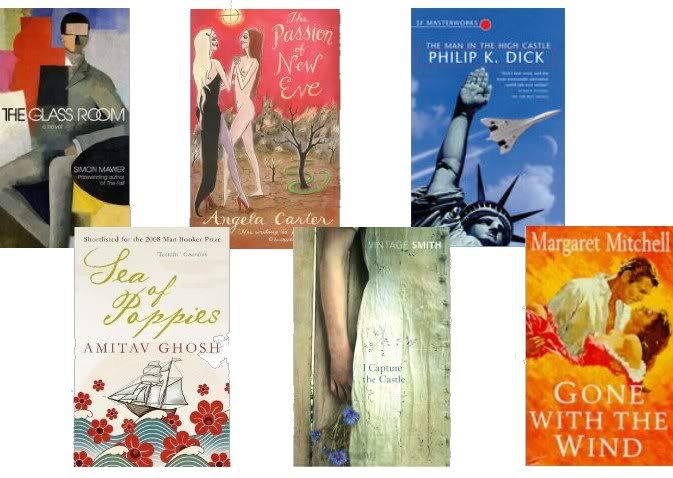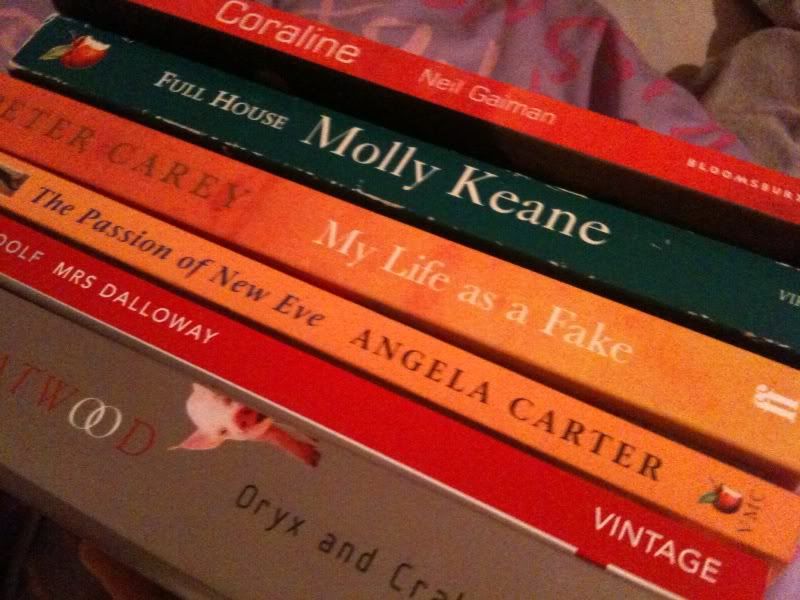 Desperation leads one to do strange things; things one would not do under normal circumstances - things one would not even consider. This is the essence of one of the bleakest books I've read this year: Out.
Natsuo Kirino's bestseller follows four women working in a bento-box factory, who turn their lives upside down, as circumstance dictates. Yayoi, in a fit of rage, strangles her husband, who was enamoured by a young hostess, and had wasted away all their savings. On realizing that she'd killed him, she contacts Musoko, one of the other factory workers, and asks for her help in disposing off the body.
Desperation leads one to do strange things; things one would not do under normal circumstances - things one would not even consider. This is the essence of one of the bleakest books I've read this year: Out.
Natsuo Kirino's bestseller follows four women working in a bento-box factory, who turn their lives upside down, as circumstance dictates. Yayoi, in a fit of rage, strangles her husband, who was enamoured by a young hostess, and had wasted away all their savings. On realizing that she'd killed him, she contacts Musoko, one of the other factory workers, and asks for her help in disposing off the body.
Musoko instantaneously decides to help, and picks up the body from Yayoi's place. After work that night, she speaks to Yoshie, and convinces her to lend a hand. Yoshie is reluctant, but, when Musuko promises a monetary reward, she concedes. Financial difficulties, and a teenage daughter plus an old mother-in-law to look after means Yoshie can always do with money!
And finally there's Kuniko, a compulsive spender, who needs money to pay off the interest on her loans. Greedy, materialistic and untrustworthy, it's no surprise that Musoko doens't trust her enough to ask her for help outright. However, when she goes over to Musuko's place, to beg her for a loan, Musoko and Yoshie are in the middle of dismembering the body, and they pull Kuniko in.
After cutting the body into tiny pieces, they put the fragments into garbage bags, and decide to leave it around the city - it would be the easiest way to dispose off the body. The three girls take some of the bags each, while Yayoi plays the role of the worried wife.
When a set of bags are discovered in the park, the police suspect Satake, the psychopathic owner of a club and gambling outfit, as Yayoi's husband had gotten into a fight with him on the very evening he was killed. The girls are under the impression that they have pulled it off, and can get away scot-free...
But, old secrets come to light, and the story follows on into a glimpse of Tokyo vice: loan sharks, illegal gambling clubs, prostitution, and the like.
The book is gory, with grotesque screens described vividly: be it the dismemberment of Yayoi's husband, or a rape scene, where the rapist is stabbing the woman and causing her to bleed to death, while raping her. If you have an overactive imagination, or a sensitive tummy, this book isn't for you!
It's also a glimpse into society in Tokyo: about sexism and racism, work ethics and culture, money and vice. The women are lovelorn, their relationships with their husbands have faded into nothing, and the poverty that binds their hands, leads them to make some shocking decisions. It's not a book about friendship - it's a book about desperation, and the choices made subsequently. The ending is as bizarre as it gets, and it's another bloody gruesome picture.
The suspense in the book is limited to: will they be caught? The crime's committed in the opening chapters, and in my opinion, some of the book dragged on. It's not the best book I've read this year, but I was wolfing it down, eager to know what happened next. Some of the writing fell flat, and I personally thought that the translation wasn't great.
Rating: 3.5


 Last night I dreamt I went to Manderley again. It seemed to me I stood by the iron gate leading to the drive, and for a while I could not enter, for the way was barred to me.
Last night I dreamt I went to Manderley again. It seemed to me I stood by the iron gate leading to the drive, and for a while I could not enter, for the way was barred to me.  Amy Tan's debut novel, The Joy Luck Club, is the first book by her that I have read. It is also the first book I've read with strong Chinese references, so I wasn't quite sure as to what I should expect from this book.
The Joy Luck Club is the story of four Chinese women who have immigrated to the United States of America, under different circumstances, and all four are attempting to bring up their daughters in America - daughters who think like Americans, despite their mothers best efforts to instil in them their Chinese culture and heritage.
Amy Tan's debut novel, The Joy Luck Club, is the first book by her that I have read. It is also the first book I've read with strong Chinese references, so I wasn't quite sure as to what I should expect from this book.
The Joy Luck Club is the story of four Chinese women who have immigrated to the United States of America, under different circumstances, and all four are attempting to bring up their daughters in America - daughters who think like Americans, despite their mothers best efforts to instil in them their Chinese culture and heritage. Coraline has just moved to a new house, and after acquainting herself with the neighbours, she sets about to 'explore' the place, for, you see, she is a self-acclaimed "explorer". She finds the well she's been warned to stay away from, just to know what to stay away from, and spends as much time outdoors as possible.
However, one rainy day, she stumbles upon a door in the living room, which opens only to greet her with a brick wall. And apparently, nothing on the other side - or so Coraline's mother tells her.
Coraline has just moved to a new house, and after acquainting herself with the neighbours, she sets about to 'explore' the place, for, you see, she is a self-acclaimed "explorer". She finds the well she's been warned to stay away from, just to know what to stay away from, and spends as much time outdoors as possible.
However, one rainy day, she stumbles upon a door in the living room, which opens only to greet her with a brick wall. And apparently, nothing on the other side - or so Coraline's mother tells her.

 After being absolutely delighted with
After being absolutely delighted with  Dexter In The Dark is the third book in Lindsay's gripping series, and this one has probably been my favourite so far, which is saying a lot, since I've lapped these books up faster than a starving cat laps up a bowl of milk.
Dexter (of the "Deadly Dimples") finds himself engaged to Rita, accidentally, and he has a wedding to plan. However, that's not what's on Dexter's mind. The inner Dark Passenger seems to have absconded, and Dexter is unable to find him, or determine why he's departed. If something's scared it off, it must be serious....
Dexter In The Dark is the third book in Lindsay's gripping series, and this one has probably been my favourite so far, which is saying a lot, since I've lapped these books up faster than a starving cat laps up a bowl of milk.
Dexter (of the "Deadly Dimples") finds himself engaged to Rita, accidentally, and he has a wedding to plan. However, that's not what's on Dexter's mind. The inner Dark Passenger seems to have absconded, and Dexter is unable to find him, or determine why he's departed. If something's scared it off, it must be serious.... I'm going through a bit of a Dexter phase at the moment. I blame it on the fact that these are borrowed books, and I hate hanging on to borrowed books for too long. Plus, these books are seriously addictive, and keep you hooked on for dear life. Dexter is charming, charismatic, and committed - to killing the bad guys. He's also 'devoted' to his sister, Sergeant Deborah, and while he insists that he's not capable of feeling love, this book has a lot of "Dimpled Dexter" to the rescue references, for each time Deborah calls on him for help. He just can't say no!
This book is slightly more morbid and disturbing than the first in the series: a torturer is on the loose, and he doesn't kill. Instead, he dismembers the body beyond recognition, and leaves the "living flesh" under a mirror so they can see themselves, limbless, eyeless, noseless, earless, lipless, genital-less... you get the idea, right? He gives them enough painkillers (barbiturates) to ensure they don't die of shock, and his surgical skills surpass excellence, as the wounds all seem to heal, and there's no blood involved. Dexter, in his dark humor, refers to the torturer at large as 'Dr. Dismember'.
I'm going through a bit of a Dexter phase at the moment. I blame it on the fact that these are borrowed books, and I hate hanging on to borrowed books for too long. Plus, these books are seriously addictive, and keep you hooked on for dear life. Dexter is charming, charismatic, and committed - to killing the bad guys. He's also 'devoted' to his sister, Sergeant Deborah, and while he insists that he's not capable of feeling love, this book has a lot of "Dimpled Dexter" to the rescue references, for each time Deborah calls on him for help. He just can't say no!
This book is slightly more morbid and disturbing than the first in the series: a torturer is on the loose, and he doesn't kill. Instead, he dismembers the body beyond recognition, and leaves the "living flesh" under a mirror so they can see themselves, limbless, eyeless, noseless, earless, lipless, genital-less... you get the idea, right? He gives them enough painkillers (barbiturates) to ensure they don't die of shock, and his surgical skills surpass excellence, as the wounds all seem to heal, and there's no blood involved. Dexter, in his dark humor, refers to the torturer at large as 'Dr. Dismember'. I'm guessing that most of you must have heard of Dexter (the TV show is really popular at the moment) - Blood spatter specialist by day, serial killer by night? But, he's a serial killer with a conscience - you see, he only kills the people who deserve to die. The pedophiles, the rapists, the evil nurse.
I'm guessing that most of you must have heard of Dexter (the TV show is really popular at the moment) - Blood spatter specialist by day, serial killer by night? But, he's a serial killer with a conscience - you see, he only kills the people who deserve to die. The pedophiles, the rapists, the evil nurse.